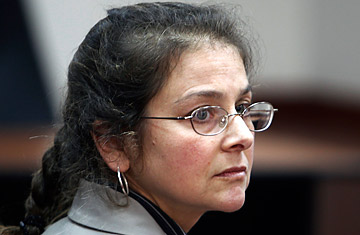
U.S. citizen Lori Berenson attends a hearing in August 16, 2010.
Peru's court system continued its ping-pong treatment of Lori Berenson late Friday afternoon, once again granting the New York native parole on her 20-year sentence on terrorism charges. Berenson, hands clasped in her lap and flanked by two prison guards, sat motionless during the 75-minutes it took to read Judge Jessica Leon's verdict. She did not move when the court reporter announced that she would be allowed to serve the remaining years of her sentence outside of prison, though remaining in Peru.
It is the second time that Leon has ruled in Berenson's favor, approving an initial parole request in May. The state's anti-terrorism prosecutor appealed that ruling and a three-judge panel ordered Berenson to return to prison in August. The decision was not based on the appeal itself, but a technical error involving the address provided when Berenson was released. She returned to prison with her 17-month old son, Salvador.
Berenson, 40, was informed that the issue would be resolved in 10 days, but Leon was unavailable to review the case and then the anti-terrorism prosecutor's office filed a motion to have her recused from the case, dragging out the process. Leon not only ratified her initial decision, but used the nearly 80 pages to tear apart the arguments of Anti-Terrorism Prosecutor Julio Galindo. Galindo stared at Leon throughout the two-hour hearing in a small room in the women's prison where Berenson is held. The judge never returned the stare, instead focusing on the court reporter reading her ruling or on Berenson.
Galindo was livid when the decision was announced. He not only shouted that he would present a new appeal, but tossed the microphone on the table for good measure. He went on the attack once outside the prison, telling a pack of journalists that Leon had made a mockery justice. He told TIME that this is "a dark day for justice in Peru. There is no longer any protection of law-abiding citizens. We are now at the mercy of terrorists and their new patron saint, Jessica Leon."
While there have been thousands of trials and retrials since 1992, when the leaders of the Marxist Tupac Amaru Revolutionary Movement (MRTA) and more violent Shining Path were arrested, Berenson's case has also sparked massive interest partly because she is an American woman, but also because of the circumstances of her arrest and a belligerent image when first presented to the media. She did not help her cause by later declaring that the MRTA were freedom fighters not terrorists in a country where nearly 70,000 people were killed in political violence between 1980 and 2000. Berenson was arrested in November 1995 for renting a house that was used to plan a failed take over of the Peruvian Congress. She was initially sentenced to life in prison in a military court by judges who were hooded and had their voices distorted.
That sentence was annulled in 2000 and Berenson was retried the following year, receiving 20 years on the charge of collaboration with a terrorist group. She later married Anibal Apari, a former MRTA inmate, and gave birth to her son in 2009. (He is now estranged from her but remains her lawyer.) She recognizes her case is complicated, telling TIME in an August interview "my case is not a normal case and has never been a normal case. It has been so high profile that I have come to personify terrorism for many people."
Apari was upbeat about Leon's latest ruling. "This was a demonstration of the independence of the court, which did not bend to political pressure and unacceptable threats. If the prosecutor disagrees he should appeal, not insult and attack the judge," he said.
Galindo was not the only one going after Leon. Before the hearing, Justice Minister Rosario Fernandez told reporters that she was concerned that Leon would repeat the mistake and grant Berenson's release. "The judge really has no alternative than to reject the request from Berenson," she said. Fernandez told reporters after the ruling was announced that the state would present solid evidence to have Leon’s decision overturned. She said arguments supporting the appeal would be presented first thing Monday and that Berenson could be back in prison by late November. The appeal will be heard by the same national court that sent Berenson back to prison in August. This time, however, the three judges will have to rule on the substance of the appeal, because the technical issue over the address has been resolved.
The principal issue now is whether or not Berenson complied with legislation, which was repealed in October 2009, allowing convicted terrorists to be released after serving 75% of their sentence. The prosecution argues that Berenson served only 14 years and six months of her sentence, with the 15-year mark coming this Nov. 30. Judge Leon's decision, however, computes an additional 12 months for good behavior, work and study while Berenson served her sentence in four different prisons around the country. To come to their decision, the judges on the panel will have to sort through reams of anti-terrorism laws that have been passed, repealed and passed again in the past two decades.
